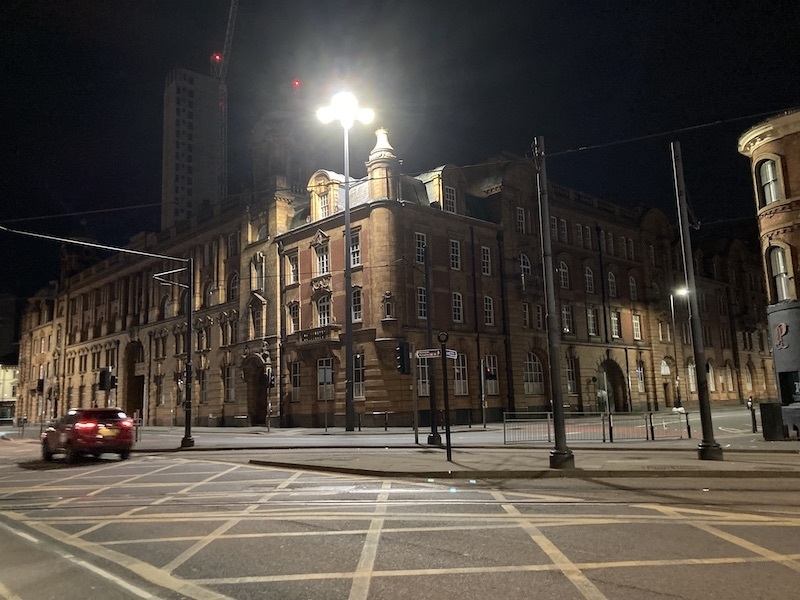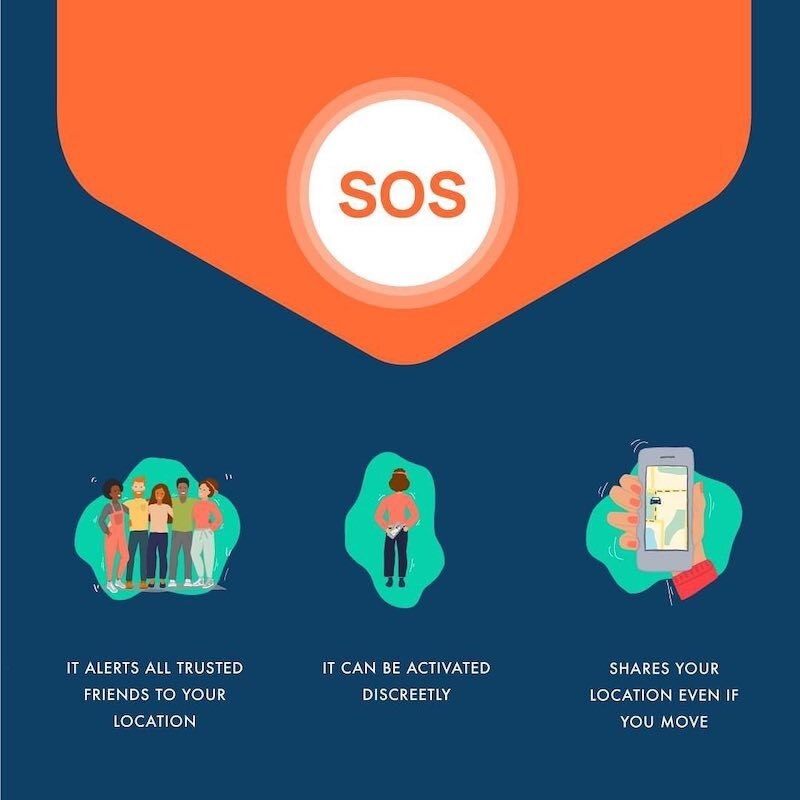Molly Sword looks into the safe travel app and asks if enough is being done to make women feel safe in the city
Last month saw Saoirse Ronan vocalise on national television what many women feel when it comes to their personal safety. While her male peers questioned with amusement how you could use your phone as a weapon while being attacked, Ronan said “That’s what girls have to think about all the time. Am I right ladies?”
Meanwhile September saw the launch of a new app, WalkSafe, designed to help people across Manchester stay safe and report concerns when moving around the city.
The nature of the free app is that you can choose safe travel routes and share your location with selected friends to let them know you have arrived safely at your destination.
While the app is made to assist everyone, it especially supports women following the concerns for women’s safety that emerged from the murder of Sarah Everard, the spiking incidents of 2021 and the reports earlier this year of unconsented filming of girls walking in the city.
These growing concerns meant that many felt action needed to be taken by police, the council and businesses to ensure women and the public more widely feel safer walking the streets.

Concerns for women’s safety in Manchester
Following the horrific news of Sarah Everard’s kidnapping and murder after walking home from a friend’s house, there was a growing focus on improving the nighttime safety of women across the UK.
The year 2021 was also a difficult time for women in Manchester as a rise in spiking created a fear of being injected or jabbed with a date rape drug. The response was a push for the council and businesses to take preventative action and ensure more safety for women in Manchester.
The council responded with the Women’s Night-time Safety Charter, an initiative to provide training to businesses to create a zero-tolerance policy on the harassment of women.
Councillor Joanna Midgley, deputy leader of Manchester City Council said: “The response that we saw to our night-time safety charter was incredibly gratifying, seeing businesses across the sector rally behind us to make Manchester a safer city.”
As the charter began to show positive results with more businesses taking action to increase the safety and support for women, the concerns became perhaps less relevant in our news and media.
However, the unconsented videoing of girls walking through Manchester across the spring and summer seasons reintroduced concerns for women’s safety. Such videos have been posted on X and TikTok and have been labelled as an alternative option to pornography.
This once again highlighted the still-ongoing concerns for women’s safety, leading the council to respond with its backing of the safe travel app, WalkSafe.

WalkSafe was created by Emma Kay, the daughter of a Metropolitan Police Officer, who is passionate about improving the safety of women across Manchester, having herself experienced incidents of catcalling, following, groping, and flashing.
Emma also has first-hand experience of working with women who fear walking alone at night due to their personal negative experiences of being made to feel targeted or uncomfortable.
The birth of her daughter was her call to action, as she “didn’t want her growing up in this normal” and became determined to increase awareness of women’s safety and implement change.
The app is an inspiring use of innovative technology where people can share their location with friends and find safe routes to remove the anxiety of walking alone through the city.
Here’s Emma with a brief explanation of how the app works.
Women’s response to the app
In the week following the release of the app I conducted a study of 25 young women who live in Manchester. While the app has had an overall positive response, some concerns were raised, such as the fear that the app puts women’s safety into their own hands rather than working with businesses and police to ensure preventative measures for the protection of women on the streets.
Councillor Joanna Midgley, deputy leader of Manchester City Council, said: “In an ideal world, anyone should be able to go where they want when they want, but until then, it is important we put measures in place to protect and empower our residents.”
It is important to acknowledge that while apps like this are important, they should not necessarily need to exist and with continual police and business cooperation and enforcement there remains the hope that one day they will not need to.
My recent survey of women who lived in Manchester found that 100% of those asked have been made to feel uncomfortable when walking through Manchester, showing the pressing issue of the problem of harassment for women in the city.
It was also revealed that women in Manchester do not currently believe enough is being done by the police to support women’s safety. When asked, ‘on a scale of 1-10, do you believe there is enough police support on the streets to help women?’, with a score of 10 meaning ‘I feel very supported’, the mean average answer was 2.5.
In response to this concerning statistic a spokesperson for Greater Manchester Police said: “The safety of all of those enjoying the night-time economy, including women and girls, is of the utmost seriousness.”
Furthermore, in statement Chief Inspector Stephen Wiggins of GMP’s City of Manchester Central district said: “I would stand confidently as to say that the vast majority of people will be able to go out without incident or injury.”
Wiggins went on to explain that while support is not always visible, the use of plain-clothed officers ensures more safety for women.
“These officers can be highly visible uniformed officers, or those in plain clothes,” he said. “So if people don’t always see a large presence of police officers in uniform, it doesn’t necessarily mean police aren’t around keeping you safe.”
In terms of support from businesses a similar concern was raised, with one University of Manchester student saying: “When it comes to businesses some are better than others. I think there is a long way to go and hardly anything is currently being done in my opinion.”
While it is evident that women in Manchester do not feel safe and believe there needs to be more police and business support, the response to the app was positive, with 100% saying they would use it.
Ultimately WalkSafe seems to be an important and worthwhile piece of technology and a step in the right direction for supporting women’s safety in the city.
However, it is also concerning that a number of women feel there is not enough being done by police and businesses to ensure their safety, and while the council have previously stated they are working to improve this perception it is clear that there is still some way to go.
There remains a need for continued awareness of women’s safety issues and support by institutions across Manchester, so that in the future women are not holding the responsibility for feeling safe in their own hands.
Am I right, ladies?
For more information on WalkSafe and to download the app visit their website.
Get the latest news to your inbox
Get the latest food & drink news and exclusive offers by email by signing up to our mailing list. This is one of the ways that Confidentials remains free to our readers and by signing up you help support our high quality, impartial and knowledgable writers. Thank you!

Join our WhatsApp group
You can also get regular updates on news, exclusives and offers by joining the Manchester Confidential WhatsApp group.

















